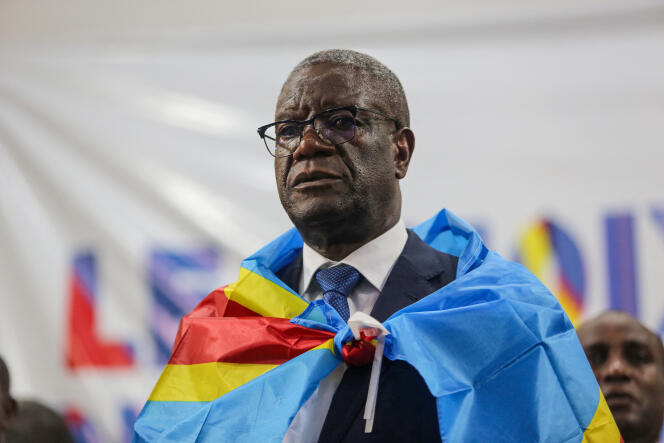


A year ago, in the posh Central Paris hotel where he met with visitors during his short stay in France, Denis Mukwege enjoyed scrolling on his phone through the dozens of messages he received every day. Texts and videos from women in his country who, he said, had all asked him to stand in the next presidential election. Back from a European tour that took him to London, Brussels, Naples, and even to meet with Pope Francis at the Vatican to plead the cause of victims of sexual violence in the Democratic Republic of Congo's (DRC) east, the gynecologist still seemed hesitant about his next step. You could sense both excitement and anxiety in him. A tug-of-war between the fantasy of a destiny to become the country's redemptive president and the fear of running into a dead end in his hitherto flawless career.
This most famous Congolese doctor has now made up his mind. With both fists raised, he strode through a cheering crowd in Kinshasa on Monday, October 2 to take to the stage. "I am ready," he said from the podium, visibly galvanized by his supporters: "I have long refrained from answering this call, it was not for me to involve myself," but from now on "I accept to be your candidate for the presidency of the Republic." Interrupted many times by cheers from the crowd, and once by a power cut, this 68-year-old doctor described a country that had "become the disgrace of the continent and the laughingstock of the world," in the hands of a "corrupt" ruling class and "threatened by balkanization." With just one speech, the civil society activist became an opponent of the incumbent president, Félix Tshisekedi, who is in the running for a second term in the election scheduled for December 20.
"We often discussed a possible candidacy, but he hadn't said anything to me about his decision. Until recently, few people were informed of his choice, perhaps not even his wife," said Belgian documentary filmmaker Thierry Michel, who in 2015 co-produced a documentary on Mukwege entitled L'Homme qui répare les femmes : la Colère d'Hippocrate (The Man who Mends Women: The Wrath of Hippocrates). The film contributed to bringing the doctor – who hails from the eastern DRC town of Bukavu, set between dense forest and Lake Kivu – to international attention, and to popularizing his nickname, coined by journalist Colette Braeckmann.
Mukwege, "The Man who Mends Women", is the gynecological surgeon who founded the Panzi Hospital in 1999, a clinic that treats women victims of sexual violence, an unprecedented and extraordinary act in a region plagued by the crimes of militias and rebels. "I am an outraged citizen," said this imposing man on Monday, October 2, his forehead furrowed with deep wrinkles. Winner of the Sakharov Prize in 2014 and the Nobel Peace Prize in 2018, Mukwege is the first Congolese person to have strived to repair the shredded vaginas and bruised bodies of tens of thousands of women in a country that has become the "rape capital of the world," the term used in 2010 by Margot Wallström, the UN Secretary-General's Special Representative on Sexual Violence in Conflict.
You have 61.16% of this article left to read. The rest is for subscribers only.
